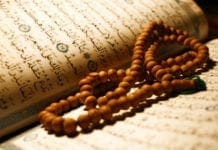Regarding the significance of dhikrullah or the remembrance of God, Allah says in the Qur’an, itself the ultimate reminder (dhikr) to all the worlds [Surah Sad, 38: 87], the following:
“Remember Allah for He has guided you.” [Surah al-Baqarah, 2:198.]
“O you who believe! Remember Allah often with much remembrance. And glorify Him morning and evening.” [Surah Luqman, 31: 41-42.]
“And men who remember God much and women who remember – God has prepared for them forgiveness and a vast reward.” [Surah al-Ahzab, 33: 35.]
Hadith literature is similarly replete with references to the remembrance of Allah:
 “The servant cannot perform a better deed which will save him from God’s punishment than the remembrance of God.” (Reported by Malik.)
“The servant cannot perform a better deed which will save him from God’s punishment than the remembrance of God.” (Reported by Malik.)
“Whoever wishes to feast in the gardens of Paradise, let him remember God often.”(Reported by Tirmidhi.)
“Indeed, with regard to dhikr, the Qur’an concludes: And the remembrance of Allah is the greatest deed without doubt.” [Surah al-Ankabut, 29:45]
The significance of dhikr lies in the fact that it is God’s own chosen and recommended mode by which the Muminun or Believers show gratitude for having been shown the straight path. In addition, it is indeed the surest way of attaining God’s forgiveness and achieving the ultimate reward of Paradise.
The importance of dhikr then is not difficult to understand. It is dhikr that purifies your qalbor heart and makes it sound. And you can only attain salvation and true success by having a pure and sound heart.
The qalb or `heart’ referred to here is not the pump in your breast that pushes blood around your body but rather the centre or locus of your personality which pumps out your desires and motivations and which makes you conduct yourself as you do. It is this qalb that lies at your centre and dictates your actions which is the key to your ultimate success.
Thus, with reference to the Day of Judgment, the Qur’an declares:
“It will be a Day when neither wealth nor children shall profit [and when] only he [will be saved] who comes before God with a sound heart [free of evil].” [Surah ash-Shuara, 26:88-89.]
This point is more elaborately made in a hadith in which the Prophet says:
 “Listen [to me] carefully. There is a lump of flesh in the body – if it is set right and made good, the entire body becomes good and healthy; but if it becomes diseased, the entire body becomes diseased. Remember well – it is the Heart.” (Reported by Bukhari.)
“Listen [to me] carefully. There is a lump of flesh in the body – if it is set right and made good, the entire body becomes good and healthy; but if it becomes diseased, the entire body becomes diseased. Remember well – it is the Heart.” (Reported by Bukhari.)
If the heart is the key to ultimate salvation and success, it may, likewise, be the seat of much corruption and open doors to many evils. It may facilitate the corruption of political and economic activities and ultimately the social institutions of a society. Where such a state prevails, the Qur’an suggests “that it is because people, individually, have become diseased in their hearts.” [Surah al-Baqarah, 2:10.]
In this state, people stop seeing and doing what is right. The Qur’an explains that “this is not because they have become blind in their eyes but because their hearts have become blind.” [Surah al-Hajj, 22: 46.]
This blindness only draws them nearer to the ultimate chastisement.
It is the heart, as the decider of our ultimate fate, that must then be the starting point of any tazkiya programme, to purify this heart and then summon it to the service of mankind.
Ibn al-Qayyim, one of the great scholars of Islam, states in his Kitab al Adhkar (The Book of Remembrance), that ‘the heart which is devoid of the remembrance of Allah is a heart that is dead’; it is dead even and long before the body carrying the heart reaches its grave. Indeed, this living body that carries the heart is the heart’s grave. Ibn al-Qayyim‘s statement is reminiscent of the hadith of the Prophet which states: “The difference between someone who remembers His Lord and someone who does not is like the difference between the living and the dead.” (Reported by Bukhari.)
The statement is also reminiscent of the following verse of the Qur’an: “Do not become like those who forget Allah and Allah makes them forget themselves. It is they who are truly deprived.” [Surah al-Hashr, 59:19.]
“The purpose of tazkiya is to ensure that the heart never falls into a sorry state of being and that it is always alive with the remembrance of God. Prosperous indeed is one who purifies himself and remembers the name of His Guardian-Lord, and prays [unto Him].”[Surah al-A’la, 87: 14-15.]
 The Prophet further emphasised the importance of dhikr when he said to his Companions: ‘Shall I not inform you of the best of your actions, the purest in the sight of your Lord, which raises your rank to the highest, which is better for you than spending gold and silver, better than meeting your enemy so that you strike at their necks and they strike at yours?’ They replied: ‘Yes, indeed,’ and he said: ‘It is the remembrance of Allah.’ (Reported by Tirmidhi.)
The Prophet further emphasised the importance of dhikr when he said to his Companions: ‘Shall I not inform you of the best of your actions, the purest in the sight of your Lord, which raises your rank to the highest, which is better for you than spending gold and silver, better than meeting your enemy so that you strike at their necks and they strike at yours?’ They replied: ‘Yes, indeed,’ and he said: ‘It is the remembrance of Allah.’ (Reported by Tirmidhi.)
Strive then, to fill all your moments, all your thoughts and all your actions with His remembrance. Recite tasbih or words of glorification and praise to punctuate all your actions and achievements.





